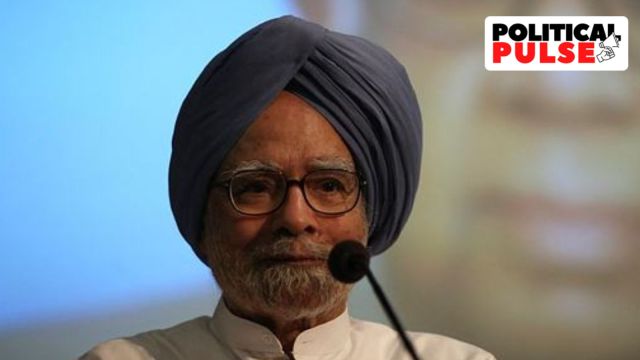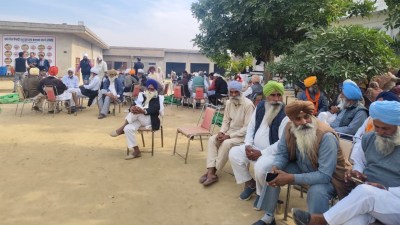Congress seeks a separate resting place for Singh, a practice his govt discontinued in 2013
The Congress’s appeal is notable as it is often accused of ignoring its stalwarts outside the Gandhi family.
 The government has already declared seven days of mourning for Singh. (Express Archives)
The government has already declared seven days of mourning for Singh. (Express Archives)The Congress has approached the Centre seeking a resting place for former Prime Minister Manmohan Singh, who died Thursday night, along the banks of the Yamuna river in Delhi, where many former PMs have their memorials.
The party paid rich tribute to Singh with the Congress Working Committee calling him a towering figure in India’s political and economic landscape, whose contributions transformed the country and earned him respect worldwide.
The CWC, which met in the evening in the presence of party chief Mallikarjkun Kharge, Congress Parliamentary Party chairperson Sonia Gandhi and former president Rahul Gandhi, said Singh’s vision of economic reform, social justice, and inclusive growth will continue to inspire and guide the party.
Sources said Kharge has conveyed the party’s desire to have a resting place for Singh in Delhi to Prime Minister Narendra Modi. Separately, All India Congress Committee (AICC) general secretaries Priyanka Gandhi Vadra and K C Venugopal followed it up with Union Defence Minister Rajnath Singh on Friday.
Singh will be cremated Saturday and his final journey will commence from the AICC headquarters at 9.30 am.
Sources said the government is yet to get back to the Congress. Incidentally, it was the UPA government headed by Singh that had blocked demands for separate memorials. In 2013, the UPA Cabinet decided to set up a common memorial ground – the Rashtriya Smriti Sthal at Raj Ghat – in view of the paucity of space.
The Congress’s desire to have a separate resting place for Singh is notable as it is often accused of ignoring its stalwarts outside the Nehru-Gandhi family and playing down their contributions to the country.
The Congress and the Gandhi family still carry the stigma of humiliating former Prime Minister P V Narasimha Rao after his death.
Given the fraught relations between Sonia Gandhi and Rao, the Congress shunned the former PM after he demitted office in 1996 following an eventful tenure that saw not only the Babri Masjid demolition, but also the unshackling of the Indian economy and the Jharkhand Mukti Morcha (JMM) bribery scandal.
For years, the Congress refused to acknowledge Rao’s role in opening up the Indian economy, the biggest reforms India has seen since Independence.
Rao was the first PM outside the Nehru-Gandhi family to complete a full term in office. And, he continues to be the only Congress PM who does not have a separate resting place in the Capital. His body was not even allowed inside the 24, Akbar Road headquarters of the AICC when he died in December 2004, with his cortege forced to park on the pavement outside the main gate.
Rao finally got a memorial in 2015, 10 years after his demise. The NDA government built a memorial ghat for Rao at Ekta Sthal Samadhi Complex on the grounds that he was entitled to state honours as a former PM. The BJP government awarded the Bharat Ratna, the highest civilian honour, to Rao earlier this year.
The government has already declared seven days of mourning for Singh.
The CWC said Singh was a true statesman, whose life and work profoundly shaped the destiny of India. “Dr. Singh was a towering figure in India’s political and economic landscape, whose contributions transformed the country and earned him respect worldwide. As Finance Minister in the early 1990s, Dr. Singh was the architect of India’s economic liberalisation,” it said.
“With unmatched foresight, he initiated a series of reforms that not only saved the nation from a balance-of-payments crisis but also opened the doors to global markets. Through his policies of deregulation, privatisation, and the encouragement of foreign investment, he laid the foundation for India’s rapid economic growth. Under his stewardship, India emerged as one of the world’s fastest-growing economies, a testament to his brilliance and vision,” it said.
The CWC said Singh, as Prime Minister, led the country with a sense of calm determination and exceptional wisdom.
“His tenure was marked by sustained economic growth, global recognition, and social progress. He steered the nation through the challenges of the global financial crisis in 2008 with strategic measures that shielded India from its worst effects. His leadership saw remarkable initiatives like MGNREGA, Right to Education, the historic Indo-US Civil Nuclear Deal, National Food Security Act, Land Acquisition Act, Agricultural Debt Waiver and Debt Relief Scheme, and the 93rd Constitutional Amendment that advanced social justice for Scheduled Castes, Scheduled Tribes, and OBCs through Article 15(5).”
“He also championed the Right to Information (RTI) Act to enhance transparency, the Forest Rights Act to empower tribal communities, and contributed to achieving the highest GDP growth rate during his tenure. Dr. Singh’s dedication to inclusive growth, international diplomacy, and economic modernization strengthened India’s position in the global arena, while simultaneously focusing on the welfare of the common man. His legacy as a compassionate, reformist leader who prioritized stability and development will forever be etched in India’s history,” it said in a condolence resolution.
Sonia Gandhi, in her statement, said, “In Dr Manmohan Singh’s passing, we have lost a leader who was the epitome of wisdom, nobility and humility, who served our country with all his heart and mind. A luminous and beloved guiding light for the Congress party, his compassion and vision transformed and empowered the lives of millions of Indians. He was loved by the people of India for his pure heart and fine mind. His advice, wise counsel and views were eagerly sought and deeply valued across the political spectrum in our country. Respected and admired by leaders and scholars all over the world, he was hailed as a statesman of immense wisdom and stature. Dr Manmohan Singh brought brilliance and distinction to every high office that he held. And he brought pride and honour to India.”
“For me, Dr Manmohan Singh’s death is a deeply personal loss. He was my friend, philosopher and guide. He was so gentle in his manner but so resolute in his deeply held convictions. His commitment to social justice, secularism and democratic values was deep and unwavering. To spend any time with him, was to come away enlightened by his knowledge and sagacity, moved by his honesty and integrity, and awed by his genuine humility. He leaves a void in our national life that can never be filled. We in the Congress Party, and the people of India will forever be proud and grateful that we had a leader like Dr Manmohan Singh whose contributions to India’s progress and development are immeasurable,” she said.
- 01
- 02
- 03
- 04
- 05































